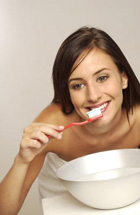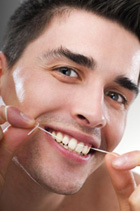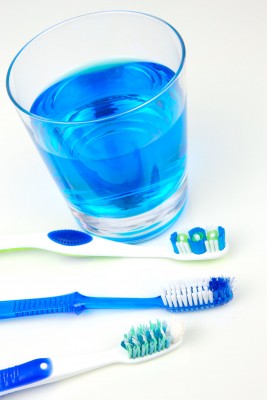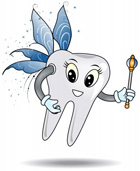 An effective oral hygiene routine should encompass a number of different activities that ought to be undertaken on a daily basis. The result of this will be a set of teeth that look good, feel good and can carry out their key functions of facilitating eating, drinking and talking without problems such as cavities and gum disease. Unfortunately, some people believe that simply brushing their teeth is all they need to do to make sure their mouth is healthy.
An effective oral hygiene routine should encompass a number of different activities that ought to be undertaken on a daily basis. The result of this will be a set of teeth that look good, feel good and can carry out their key functions of facilitating eating, drinking and talking without problems such as cavities and gum disease. Unfortunately, some people believe that simply brushing their teeth is all they need to do to make sure their mouth is healthy.
Dentists in central Leeds are telling patients that they need to do more than just brushing in order to a secure a long term future of good oral health. Brushing is very useful for removing plaque bacteria from the surfaces of teeth, moistening the mouth and strengthening teeth through the application of fluoride tooth paste but it has to be combined with other processes too.
Flossing is a crucial companion to brushing and should be done after every time that you brush. Brushing will not always remove plaque from the tight gaps between teeth; only flossing can do so. Dental floss is cheap and a box of it will last a long time.
Think about the foods you are eating as well as sugary and starchy food stuffs will only increase the level of plaque that your mouth is exposed to. Brushing after a sugary treat you’ve allowed yourself can be a great help as it won’t allow plaque to sit on your teeth after the snack.
Enlist the help of your dentist in central Leeds by going to see him or her every six months for a check up and reporting any problems should they arise.





 Patients who suffer from bad breath will go to all sorts of lengths to stop the condition from happening. It can really inhibit your social life and make things such as business meetings and job interviews into nightmare scenarios. One of the most obvious ways to rectify the problem is to use mouth wash to freshen the breath. The advertising states that mouth wash kills bacteria and freshens breath so it is a common method for people to use. But the story is not that simple.
Patients who suffer from bad breath will go to all sorts of lengths to stop the condition from happening. It can really inhibit your social life and make things such as business meetings and job interviews into nightmare scenarios. One of the most obvious ways to rectify the problem is to use mouth wash to freshen the breath. The advertising states that mouth wash kills bacteria and freshens breath so it is a common method for people to use. But the story is not that simple. From a very early age we are taught to brush our teeth every day to keep our teeth clean and healthy and if you get the right brush and paste combination that suits you, it should be enough. But is just brushing your teeth enough in Central Leeds? Pointers from dentists in the area would say no. The rules attached to oral hygiene are to primarily ensure bacteria and plaque are removed from the mouth, and both of these emanate from food deposits left in the mouth. Certain foods adhere to the surface a lot more than others, get in between the teeth and are more difficult to remove with regular brushing, which is where flossing, inter-dental brushes and mouthwashes come in. Tiny brushes and floss can be worked gently between the teeth to remove these problems from between the teeth and backed up will a good mouth-wash you have the complete oral hygiene program at your disposal. On the subject of bacteria, it’s not just the teeth and gums you should concentrate on, the tongue and the roof and floor of the mouth, also harbor bacteria so these should be cleaned as well, especially the tongue, and most brushes have a facility to stroke the surface of the tongue with. If you are unsure about the way you brush and floss, your dentist can give you pointers on you technique.
From a very early age we are taught to brush our teeth every day to keep our teeth clean and healthy and if you get the right brush and paste combination that suits you, it should be enough. But is just brushing your teeth enough in Central Leeds? Pointers from dentists in the area would say no. The rules attached to oral hygiene are to primarily ensure bacteria and plaque are removed from the mouth, and both of these emanate from food deposits left in the mouth. Certain foods adhere to the surface a lot more than others, get in between the teeth and are more difficult to remove with regular brushing, which is where flossing, inter-dental brushes and mouthwashes come in. Tiny brushes and floss can be worked gently between the teeth to remove these problems from between the teeth and backed up will a good mouth-wash you have the complete oral hygiene program at your disposal. On the subject of bacteria, it’s not just the teeth and gums you should concentrate on, the tongue and the roof and floor of the mouth, also harbor bacteria so these should be cleaned as well, especially the tongue, and most brushes have a facility to stroke the surface of the tongue with. If you are unsure about the way you brush and floss, your dentist can give you pointers on you technique. Maintaining the health of your teeth in the city of Leeds has never easier, it’s as if there’s a product for every condition in the shops these days and all you need to do is brush and floss a few times a day and that’s it; if you’re doing it correctly, you should have a trouble-free mouth. But are you doing it correctly? Flossing is designed to remove any bits of food that get stuck deep between your teeth that regular brushing can’t, but you need to get it right to achieve a good, deep clean. There’s no point in just running the thread between the teeth. You have to get it taught between your hands and run it all around the tooth and into the gums, and softly too otherwise you could break the floss or damage the gums. Doing this can take a few tries to get right, but once you get into the swing of it, you should be able to remove any bacteria from the teeth. It shouldn’t be seen just as a bolt-on to brushing either, flossing should be done after every meal aside from brushing. Some flosses come with holders and these are perfect for after meal flossing. You should try to fit it into everyday life until it becomes automatic. It can be done when you’re sitting down relaxing, even out for a walk- any time after you eaten something. Getting into this routine will help protect your teeth from all that is bad in the mouth, such as plaque and gum disease.
Maintaining the health of your teeth in the city of Leeds has never easier, it’s as if there’s a product for every condition in the shops these days and all you need to do is brush and floss a few times a day and that’s it; if you’re doing it correctly, you should have a trouble-free mouth. But are you doing it correctly? Flossing is designed to remove any bits of food that get stuck deep between your teeth that regular brushing can’t, but you need to get it right to achieve a good, deep clean. There’s no point in just running the thread between the teeth. You have to get it taught between your hands and run it all around the tooth and into the gums, and softly too otherwise you could break the floss or damage the gums. Doing this can take a few tries to get right, but once you get into the swing of it, you should be able to remove any bacteria from the teeth. It shouldn’t be seen just as a bolt-on to brushing either, flossing should be done after every meal aside from brushing. Some flosses come with holders and these are perfect for after meal flossing. You should try to fit it into everyday life until it becomes automatic. It can be done when you’re sitting down relaxing, even out for a walk- any time after you eaten something. Getting into this routine will help protect your teeth from all that is bad in the mouth, such as plaque and gum disease. Tooth decay is a great enemy of the teeth in Leeds from as early as when they first break through the gums as a baby. Residues of food and drink cause bacteria in the mouth that can leave films of acid on the teeth. If left, the acid will start to eat away at the enamel of the teeth and cavities or caries will form and decay the inside of the tooth. An x-ray at the dentist can always determine if you suffer from any tooth decay and also how bad it is. In its mildest incarnation, tooth decay can be reversed with a filling, but at worse, you will need more extensive work like root canal treatment. It’s easy to avoid if you stick to your daily routine of brushing and flossing, and make regular visits to your dentist. For some people, especially children, the dentist can apply a thin plastic coating over the teeth to protect the exposed enamel of the tooth. But if you don’t avoid it, the decay can spread and affect the health of your mouth, the treatments can become precarious if you want to save your tooth, and the costs can spiral- for you will need to reconstruct to tooth to maintain its functionality, and that means splashing out on a crown.
Tooth decay is a great enemy of the teeth in Leeds from as early as when they first break through the gums as a baby. Residues of food and drink cause bacteria in the mouth that can leave films of acid on the teeth. If left, the acid will start to eat away at the enamel of the teeth and cavities or caries will form and decay the inside of the tooth. An x-ray at the dentist can always determine if you suffer from any tooth decay and also how bad it is. In its mildest incarnation, tooth decay can be reversed with a filling, but at worse, you will need more extensive work like root canal treatment. It’s easy to avoid if you stick to your daily routine of brushing and flossing, and make regular visits to your dentist. For some people, especially children, the dentist can apply a thin plastic coating over the teeth to protect the exposed enamel of the tooth. But if you don’t avoid it, the decay can spread and affect the health of your mouth, the treatments can become precarious if you want to save your tooth, and the costs can spiral- for you will need to reconstruct to tooth to maintain its functionality, and that means splashing out on a crown. It’s hard to believe that some of the products that we buy over the counter in Leeds, that we believe to promote the health of our mouths, can actually have the opposite affect and make our breath worse. One of the causes of bad breath is the drying up of saliva in the mouth, saliva being the main component in the fight against bacteria. Bacteria breeds, it becomes pungent, and can then lead on to gum disease and tooth decay that also give off bad odours. Certain whitening toothpastes contain baking sodas, sodium lauryl sulfate
It’s hard to believe that some of the products that we buy over the counter in Leeds, that we believe to promote the health of our mouths, can actually have the opposite affect and make our breath worse. One of the causes of bad breath is the drying up of saliva in the mouth, saliva being the main component in the fight against bacteria. Bacteria breeds, it becomes pungent, and can then lead on to gum disease and tooth decay that also give off bad odours. Certain whitening toothpastes contain baking sodas, sodium lauryl sulfate On your shopping list when you visit the super market or the corner store will probably be tooth paste containing fluoride, a new tooth brush if your current one is not fit for purpose and some dental floss. But many people wonder about whether to pick up some mouth wash too. The adverts tell us that mouth wash kills bacteria and freshens breath but is it worth our while to use it?
On your shopping list when you visit the super market or the corner store will probably be tooth paste containing fluoride, a new tooth brush if your current one is not fit for purpose and some dental floss. But many people wonder about whether to pick up some mouth wash too. The adverts tell us that mouth wash kills bacteria and freshens breath but is it worth our while to use it? Bad breath can have a serious effect on your confidence. Going to parties or business meetings can become difficult as you find yourself shielding your mouth so that people don’t smell the unpleasant odours that can emanate. Many people experience it at one time or another but it is not something that needs to just be put up with because there a number of simple ways to deal with it effectively.
Bad breath can have a serious effect on your confidence. Going to parties or business meetings can become difficult as you find yourself shielding your mouth so that people don’t smell the unpleasant odours that can emanate. Many people experience it at one time or another but it is not something that needs to just be put up with because there a number of simple ways to deal with it effectively. As part of taking care of your teeth, some people turn to mouth washes. But the picture is not that clear as to how beneficial they actually are. If you want some answers about mouth washes and whether they are the best choice for you then you should read on.
As part of taking care of your teeth, some people turn to mouth washes. But the picture is not that clear as to how beneficial they actually are. If you want some answers about mouth washes and whether they are the best choice for you then you should read on. Bad breath is something that most people will probably do their best to avoid. It can make it very socially difficult knowing that there are unpleasant smells emitting from your mouth because of bacteria. These bacteria hang around from the food you eat and are usually removed by brushing alone but some people find that that is not enough.
Bad breath is something that most people will probably do their best to avoid. It can make it very socially difficult knowing that there are unpleasant smells emitting from your mouth because of bacteria. These bacteria hang around from the food you eat and are usually removed by brushing alone but some people find that that is not enough.

